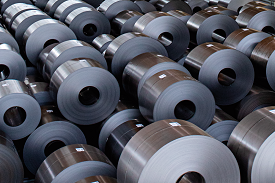
Unalloyed and alloyed steel ingots and semi-finished products are crucial raw materials utilized in the re-rolling industry for the production of various finished steel products. Unalloyed steel ingots typically consist of carbon steel with minimal alloying elements, offering high strength, durability, and machinability. On the other hand, alloyed steel ingots incorporate additional alloying elements such as chromium, nickel, manganese, or molybdenum to enhance specific properties such as corrosion resistance, hardness, or heat resistance. These ingots are produced through casting processes, where molten steel is poured into molds to solidify into specific shapes and sizes. The semi-finished products, including billets, blooms, and slabs, serve as the foundational components for further processing through rolling mills, where they are reshaped and refined into bars, rods, sheets, and structural components used in construction, automotive, and manufacturing sectors. Unalloyed and alloyed steel ingots and semi-finished products play a pivotal role in meeting the diverse demands of the re-rolling industry by offering versatility, reliability, and performance in various applications.
IS 14650:2023 plays a pivotal role in the steel industry by establishing essential standards for unalloyed and alloyed steel ingots and semi-finished products intended for re-rolling purposes. This standard outlines comprehensive technical specifications and delivery requirements, covering aspects such as chemical composition, mechanical properties, and dimensional tolerances. By setting clear parameters for factors like carbon content, alloying elements, and heat treatment processes, IS 14650:2023 ensures that the steel ingots and semi-finished products meet stringent standards for consistency and reliability in the re-rolling process. Compliance with this standard ensures the quality and performance of the final rolled steel products and contributes to the overall efficiency and reliability of various industries relying on these materials, including construction, automotive, and manufacturing sectors.
Note: Obtaining the ISI/BIS Certification is a mandatory requirement for manufacturers of Unalloyed And Alloyed Steel Ingot And Semi-Finished Products For Re-Rolling Purposes - Specification to sell their products in the Indian market.
Manufacturers are required to obtain ISI/BIS certification for their Unalloyed and Alloyed Steel Ingot and Semi-Finished Products for Re-Rolling Purposes - Specification to lawfully market and sell these products within India. This certification serves as a crucial validation of compliance with specific quality and safety standards mandated by the BIS for the production and distribution of unalloyed and alloyed steel ingots and semi-finished products intended for re-rolling purposes. Without the ISI/BIS certification, manufacturers face potential legal repercussions and obstacles in accessing the Indian market. This certification process underscores the importance of ensuring the integrity and performance of steel products used in re-rolling applications, instilling confidence among stakeholders in the steel manufacturing and construction industries regarding its suitability and adherence to Indian standards for usage and distribution.
Indian Standards Institute, or ISI was renamed the Bureau of Indian Standards (BIS) in 1987. The official mark that the Bureau of Indian Standards provides for manufacturers of various goods is the ISI Mark. It is used to indicate compliance with Indian standards (IS) set by the Bureau of Indian Standards (BIS) and has been used as a conformity marking for industrial products. Manufacturers received permission from BIS to use the ISI Mark on items that comply with relevant Indian requirements through the product certification program.
Only manufacturers (domestic or foreign) who produce the finished product will be awarded ISI Certification. This will not be given to any product importers, traders, dealers, or distributors.
The following documentation is required to get an ISI certification:
For more detailed information, please click here.
There are two approaches for Indian manufacturers to become certified with the ISI Mark:
Regular Procedure
With the possible exception of cases deemed "All India first," which might take up to 180 days, the licensing procedure is expected to be finished in 120 days. This timeline starts on the day the application is received, assuming that at different points in time the documentation, unit assessment, and product conformance are all deemed acceptable.
Step 1: Manufacturing Unit Customization in Compliance with Applicable Indian Standards
Step 2: Submission of the Application Form
For more detailed information, please click here.
Simplified Procedure
This is a much faster process than the standard procedure. After a factory inspection is deemed satisfactory and the initial evaluation establishes that the sample complies with the applicable Indian Standard(s), the license application process is expected to be finished in 30 days.
Step 1: Adapting the Manufacturing Unit to Comply with the Relevant Indian Standard
Step 2: Sample Testing
For more detailed information, please click here
The process of obtaining ISI Mark Certification for Foreign Manufacturers typically includes the following steps:
Step 1: Application
Step 2: Query Raised (If Any)
For more detailed information, please click here.
Brand Liaison provides helpful support for achieving ISI Mark Certification. Among our offerings are:
Please click here to get in contact with our team of specialists for a deeper explanation of the paperwork and steps needed to get ISI Mark Certification.